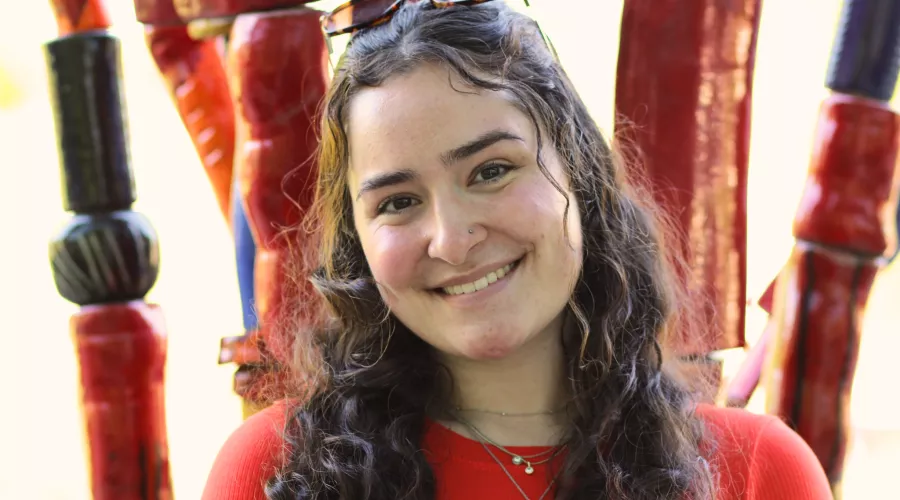Finding Her Voice—and Purpose—in Three Intersecting Disciplines: Spanish, Geography, and Sustainability
May 13, 2025
Kassidy Haynes
By Stephanie Godward, Communications and Marketing Director, College of Arts & Sciences
On her first day of volunteering in a Spanish class at St. Matthews Elementary School, Kassidy Haynes felt frazzled, new, and nervous; until she walked in and met a young boy who was crying.
Her own first-day jitters melted away as she learned the young student was not only new to the classroom but also new to the country, a native Spanish speaker with very little English to communicate. The teacher explained that they didn’t know much about him as a result; they only knew what country he was from and basic information about his family.
“At that moment, everything shifted into place,” Haynes said. “It’s an unseen struggle because a lot of people around individuals like this little boy might not necessarily be tuned into that struggle or be able to help with that struggle. Just that experience of learning about him, why he was upset, and what his situation was, and then getting a chance to sit down with him, comfort him, and talk to him, it was really powerful. Even when he was the one crying and I was speaking Spanish to help him, it was really the case that he was having a much bigger impact on me.”
An Honors scholar, Haynes graduated in May with a BA in Spanish, a BA in Sustainability, and a BS in Geography, along with a certificate in geospatial technologies. The experiential learning she engaged in within the elementary classroom that day crystallized why all three of these disciplines are important to her personally and professionally as she pursues new goals after graduation.
“I was seeing so much strength in such a young child in this unknown environment,” Haynes said. “These social issues underly a lot of issues in geography and sustainability alike, and seeing this through my lived experience helped me to answer the question, ‘What are you going to do with these three degrees?’ No matter what I do, I will always find this intersection of common values that underly all of these study areas in any job.”
Haynes chose the Sustainable Societies concentration for her Sustainability degree because it aligns with her values and the things she wants to see in the future.
“Using my knowledge of Geography, Spanish, and GIS, I want to be able to achieve a more sustainable existence on this planet for our species,” Haynes said. “There are going to be a lot of challenges along the way, and that is something that I feel like the classes in the sustainable societies track have really helped me to learn and realize.”
Her professors within the Urban and Public Affairs Department (UPA) connected her to the local issues Louisville specifically faces, providing tangible context, and how there can be similar urban problems across different cities. These topics include things like equitable and affordable housing, and access to housing. In Louisville, the context of redlining is important, in addition to the racial segregation seen throughout Louisville’s history, she explained.
“That is just one way that I think the UPA folks have done a good job with the sustainable societies track by tailoring it to Louisville and the alignment I see with that and my other majors,” she said.
Haynes presented her thesis from her Geography major in the Geographic and Environmental Sciences department and was recognized as the top presenter within the social sciences at UofL’s Undergraduate Arts & Research Showcase. She also presented at the ACC Meeting of the Minds Conference held in March at the University of Pittsburgh.
“My research investigates modern traces of settler colonialism, and I do that through a case study analysis of dams in the American West. My research question is: how have Indigenous perspectives been included in or excluded from dam construction, management, or deconstruction?” Haynes said.
She looked at the cases of the Grand Coulee Dam, the Dalles Dam, and a few others, discovering powerful results using archival data as well as oral history. Read more about this work by clicking here.
Looking ahead, Haynes is pursuing different possibilities that will move her career aspirations forward.
“I am looking forward to exercising the skills that I have gained here at UofL specifically in these fields,” she said. “I am currently a semifinalist for Fulbright Australia with a potential award in environmental sciences. If I earn that award, I will go to Australia and attain a master’s in urban planning and management at Western Sydney University in a year. If I am not selected, I will remain at UofL for an accelerated master’s in the applied geography program.”
Related News




